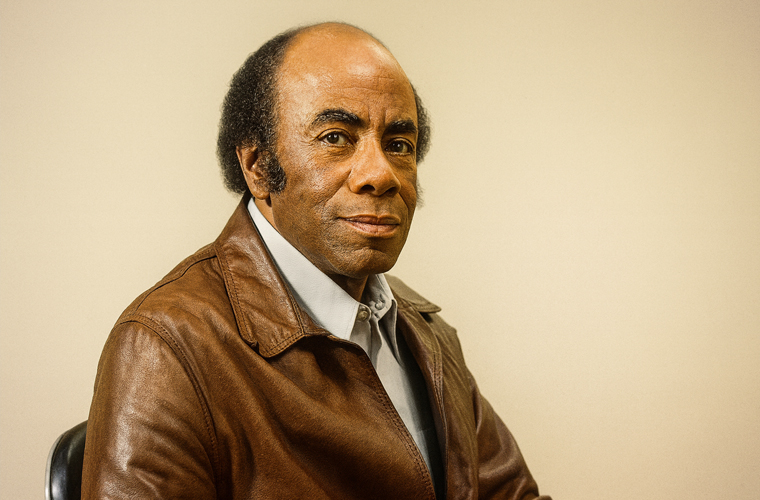Roscoe Lee Browne was a towering figure in American theater, film, and television—a baritone-voiced polymath whose career spanned over five decades. Born on May 2, 1922, in Woodbury, New Jersey, Browne brought a refined intellect and unyielding commitment to authentic portrayals, shunning stereotypical roles in favor of Shakespearean depth, satirical wit, and poetic narration. He passed away on April 11, 2007, at the age of 84, leaving behind a legacy as one of the most respected character actors of his generation.
The fourth son of Baptist minister Sylvanus S. Browne and his wife, Lovie Lee (Usher), Roscoe grew up in a nurturing, faith-filled household in Woodbury. He graduated from Woodbury Junior-Senior High School in 1939 and went on to attend Lincoln University, the nation’s first degree-granting historically Black college, where he earned a bachelor’s degree in 1946. His studies were briefly interrupted by World War II, during which he served in the U.S. Army’s 92nd Infantry Division in Italy. There, Browne not only contributed to the war effort but also organized the division’s track and field team, showcasing his athletic prowess as a middle-distance runner. He claimed two Amateur Athletic Union national indoor championships in the 1,000-yard event and later toured Europe with the USA Track and Field team in 1950–1951.












Post-war, Browne leveraged the GI Bill for postgraduate studies at Middlebury College, Columbia University, and the University of Florence. From 1946 to 1952, he taught English, French, and comparative literature at Lincoln University, honing his scholarly side. Seeking a change, he pivoted to the wine industry, working as a sales representative for Schenley Import Corporation until 1956—a role that sharpened his eloquence and love for the finer things in life.
Browne’s acting career ignited in 1956 when he left the corporate world to join New York City’s inaugural Shakespeare in the Park productions, directed by Joseph Papp. He debuted as the Soothsayer and Pindarus in Julius Caesar and a servant in The Taming of the Shrew, quickly becoming a staple of the New York Shakespeare Festival Theater. His stage work emphasized classical theater, where his resonant mid-Atlantic accent and commanding presence shone.
In 1961, he made his film debut, voicing J.J. Burden in the indie drama The Connection. By 1964, Browne had transitioned to television satire as a regular on NBC’s That Was the Week That Was, blending humor with incisive commentary. A milestone came in 1966 with his directorial debut: A Hand Is on the Gate, a revue of Black poetry and music featuring stars like Cicely Tyson and James Earl Jones. The production ran for 225 performances on Broadway, earning Browne acclaim as a director and curator of African American artistic expression.
Browne’s screen career flourished in the late 1960s and 1970s, marked by memorable supporting roles that highlighted his gravitas. In Black Like Me (1964), he portrayed a dignified companion to James Whitmore’s character, confronting racial injustice head-on. His standout film performance came in The Cowboys (1971) as Jebediah Nightlinger, the erudite cook who leads a group of boys in avenging John Wayne—a role that subverted Western tropes with intellectual flair. Other cinematic highlights included Uptown Saturday Night (1974) alongside Sidney Poitier and Bill Cosby, and a chilling voice role as the robotic Box in Logan’s Run (1976), intoning the iconic line, “Welcome, humans!”
On television, Browne was a guest star extraordinaire, appearing on landmark shows like All in the Family (1972–1973), Maude (1977–1978), Good Times (1974), and Barney Miller (1975–1976). He landed a recurring role as the sophisticated butler Saunders on the soap opera spoof Soap (1980–1981) and won an Emmy for his portrayal of Professor Foster on The Cosby Show (1986–1987). Later, he voiced the imposing Kingpin in Spider-Man: The Animated Series (1995–1998) and narrated films like Babe (1995) and Disney’s Treasure Planet (2002), where he lent his timbre to the loyal Mr. Arrow.
Browne’s narration extended to audiobooks, including Shakespeare’s sonnets, Robert Frost’s poetry, and even the Old Testament of the Bible, as well as George Lucas’s The Story of Star Wars album (1977). He also toured with actor Anthony Zerbe in the poetry duo Behind the Broken Words, captivating audiences with dramatic readings.
Browne’s accolades reflect his excellence across mediums. He earned a Primetime Emmy for The Cosby Show (1986), a Tony nomination for Two Trains Running (1992), and a Daytime Emmy nod for Spider-Man (1995). He was inducted into the Black Filmmakers Hall of Fame in 1977 and, posthumously, the American Theater Hall of Fame in 2008.
Though he avoided overt civil rights activism, Browne’s choice of roles—metaphorical rebellions against typecasting—spoke volumes about dignity and complexity in Black representation. A lifelong bachelor without children, he lived quietly in Los Angeles, succumbing to stomach cancer at Cedars-Sinai Medical Center. Today, his voice echoes in archives and animations, a testament to a man who ran races, taught literature, and redefined presence on stage and screen.

